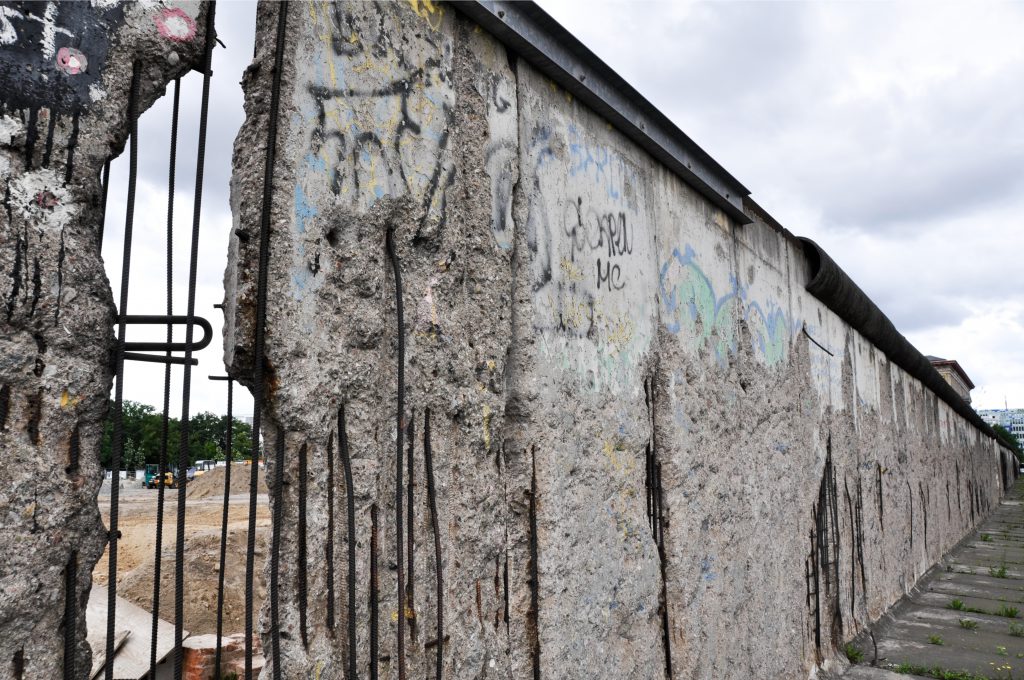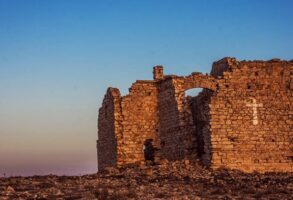
Published November 11, 2019
The Religious Freedom Institute honored Archbishop Charles J. Chaput, O.F.M.Cap., with its first “Defender of Religious Freedom Award” at a dinner in Washington, D.C. The keynote address, which follows, was delivered by George Weigel on Saturday, November 9, 2019.
Good evening, everyone.
My first word of thanks must be to RFI president Tom Farr and his colleagues, not only for their exemplary work in promoting and defending religious freedom, but for honoring Archbishop Charles Chaput, a great defender of religious freedom for all and the model of a Catholic bishop for the 21st century.
Thirty years ago tonight, on November 9, 1989, the Berlin Wall was peacefully breached. And while there would be more drama to come during the remaining two months of what we now know as the “Revolution of 1989,” the symbolic apogee of that year of miracles was reached when, in the words of the old spiritual, “the wall came tumblin’ down” – a few months after the dessicated leader of the East German communist party, Erich Honecker, had bragged that “the Wall will last for another 100 years!”
For those of you who did not have the opportunity to experience it in person, “the Wall” was a vulgar, obscene thing, something like a festering wound, a deep gash in the body politic of the West.
It was actually two concrete walls, over 96 miles long, separated by some thirty or forty yards of sand and barbed wire, with automatic machine-guns, guard posts, and attack dogs keeping watch, lest anyone escape the people’s paradise of the German Democratic Republic.
The Wall was begun in 1961, to stem the flow of emigrés (and especially young professionals) from the German Democratic Republic: men and women who, by voting with their feet, gave poignant personal expression to one of the great, black humor jokes of that era: “Q. What is the relationship of democracy to socialist democracy?” A. “The same as the relationship between a chair and the electric chair.”
The side of the Wall facing into West Berlin was entirely covered with graffiti, making the sheer brutality of the thing even uglier. And that ugliness was not merely physical. It was also spiritual, for the Wall marked a divide between a world from which the God of the Bible had been expelled in the name of an ersatz form of human liberation, and a world that, however confusedly, retained some grip on the fact that its civilizational patrimony drew from the wellsprings of biblical religion.
Standing on the West Berlin side of the Wall in 1987, near what is now Alexanderplatz, I could not help noticing a ramshackle souvenir stand which, to my amazement, was selling Che Guevara tee-shirts – evidence, I suppose, that some people never, ever get it.
But there are less vulgar forms of not-getting it. And they, too, should be called out for what they are: distortions of reality that make it impossible to achieve the noblest aspirations of the human spirit – the aspirations to believe truly and to worship that which is worthy of worship.
Thus, just a few days ago, the German foreign minister, Heiko Maas, wrote a brief essay on the fall of the Wall, for which he credited just about everyone and everything: except the pivotal figure in the Revolution of 1989 and the religious sources of the revolution of conscience that made the nonviolent overthrow of the greatest tyranny in human history possible – which is to say, the foreign minister ignored both Pope St. John Paul II and the religiously-informed and religiously-sustained movements that gave the revolution of 1989 its unique texture.
Some people do get it, however, and one of them is America’s most distinguished historian of the Cold War, John Lewis Gaddis of Yale University. Professor Gaddis is not a Catholic, so he cannot be accused of sectarian bias when he writes, “When John Paul II kissed the ground at the Warsaw Airport on June 2, 1979, he began the process by which communism in Poland – and ultimately everywhere – would come to an end.”
There was, then, a deep and decisive causal connection between the first of the Nine Days of John Paul II in Poland in June 1979 and the stunning events of thirty years ago in Berlin. And the bright thread within that connection was religious freedom, for which the people of Poland demonstrated in Warsaw on June 2, 1979, when they chanted, rhythmically, prior to the papal Mass in Victory Square that day, “We want God! We want God!”
European communism would have died at some point of its own implausibility and its economic incapacities; and that point was almost certainly going to come far sooner than Erich Honecker and the other neo-Stalinist dinosaurs of the Warsaw Pact leadership in the 1980s anticipated. But if you ask the question, why “1989” happened when it did, thirty years ago (rather than twenty years ago in 1999, or ten years ago in 2009, or even this year); and if you ask the further question, why did European communism collapse how it did, without mass violence, which was the twentieth century’s typical method of effecting great social change; then, like Professor Gaddis and other historians not blinkered by a myopic secularism, you must give full marks to the revolution of conscience ignited by John Paul II in Poland in June 1979.
How did that ignition take place? Look through the many speeches, homilies, and addresses of the Nine Days and you won’t find John Paul making a single reference to politics or economics. Nor will you find any reference to Poland’s communist government, which John Paul thanked on his arrival, thanked again on his departure, and completely ignored in between. Rather, in a host of variations on one great theme, John Paul II said to his fellow Poles, over those nine days on which the history of the twentieth century pivoted, “You are not who they say you are. Remember who you are – a people formed by faith and steeped in Christian history – and you will eventually find tools of resistance that communism can’t match.”
That message resonated across a central European landscape on which men and women of good will, believers and religious skeptics alike, had already been exploring ways to make the defense of fundamental human rights into a resistance tool against communism. After the Nine Days of John Paul II, new human rights initiatives were launched and new alliances were forged, across political and sectarian lines, uniting believers and skeptics. And after ten hard years, a nonviolent revolutionary movement determined to “live in the truth” (as Václac Havel put it), sustained by a powerful combination of faith and courage, and supported by effective Western foreign and defense policy, triumphed: the Wall came tumbling down, and Stalin’s derisive question, “How many divisions has the Pope?” got its answer: “More than you know. More than you could ever imagine.”
It’s a sadness that, three decades later, the foreign minister of a united Germany does not understand the crucial role the demand for religious freedom played in the Revolution of 1989, from which we may infer that the foreign minister’s grip on the importance of religious freedom for sustaining democracy is not a firm one. But Mr. Maas is not alone.
Just a few days ago, the former President of Ireland, Mary McAleese, gave a bizarre speech at Trinity College, Dublin, in which she suggested that the baptism of infants and the obligation of parents and godparents to raise those baptized children in the faith may involve violations of the U.N.’s Covenant on the Rights of the Child. And because there are no Charles Chaputs among the Catholic bishops of Ireland, there has been no challenge from an authoritative Church voice on the Emerald Isle to this blatantly discriminatory suggestion from a public figure who is giving new definition to the meaning of “self-loathing Catholic.”
But lest we dismiss President McAleese’s rant as so much Celtic craziness, let’s not forget that the previous American administration threatened to shackle, perhaps even literally, the Little Sisters of the Poor if they failed to provide contraceptives to which they were morally opposed to their employees; or that Protestant ministers in Canada have been fined for preaching biblical morality; or that, in any number of other venues throughout the West, someone’s claim to “human rights” has been used to whittle away at religious freedom in full. And that, of course, is before we get to the threats to religious freedom posed by jihadist Islam and neo-Maoist China.
Thirty years ago, in a moment of euphoria, we may have thought that history had vindicated the cause of freedom, especially religious freedom. Today, we must recall, daily, the motto on the Korean War Veterans Memorial, a mile or so from where we meet tonight: “Freedom Is Never Free.” To which we might add, freedom is never secure: freedom must be earned anew, in every generation, if we are, as President Kennedy pledged at the inaugural on January 20, 1961, “to secure the blessings of liberty to ourselves and our posterity.”
That is why the Religious Freedom Institute, under whose auspices we gather tonight, is such an important and welcome initiative: important, because of the nature of the cause, which is the defense of the first freedom; welcome, because of the immense wealth of talent and experience that RFI brings to its work, here and around the world.
And that is why a leader like Archbishop Chaput is so important: because, in that ongoing struggle to secure the blessings of liberty to ourselves and our posterity, some must lead – some must take the heat, some must endure the slings and arrows of the critics, some must say, “Here is where we must go,” and then take the point, summoning other to follow.
There is much work to do. History is not over, and, to repeat, freedom is never free. So as we gather strength tonight for the task ahead, let us also remember, on this stirring anniversary, that the good guys sometimes win. More urgently, let us remember that the Lord always wins. Because whether we understand his ways or not, we may be reassured by the words of St. John Henry Newman: “He knows what he is about.”
George Weigel is Distinguished Senior Fellow of Washington’s Ethics and Public Policy Center, where he holds the William E. Simon Chair in Catholic Studies.











